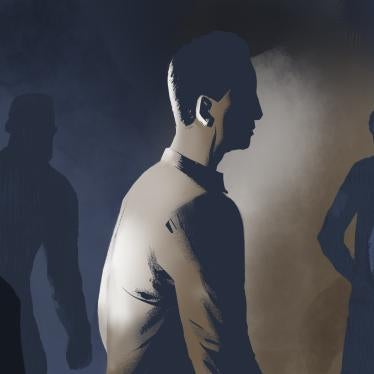(Beirut) – Government officials across the Middle East and North Africa region are targeting lesbian, gay, bisexual, and transgender (LGBT) people based on their online activity on social media, Human Rights Watch said in a report released today. Security forces have entrapped LGBT people on social media and dating applications, subjected them to online extortion, online harassment, and outing, and relied on illegitimately obtained digital photos, chats, and similar information in prosecutions, in violation of the right to privacy and other human rights.
The 135-page report, “‘All This Terror Because of a Photo’: Digital Targeting and Its Offline Consequences for LGBT People in the Middle East and North Africa,” examines the use of digital targeting by security forces and its far-reaching offline consequences – including arbitrary detention and torture – in five countries: Egypt, Iraq, Jordan, Lebanon, and Tunisia. The findings show how security forces employ digital targeting to gather and create evidence to support prosecutions.
“The authorities in Egypt, Iraq, Jordan, Lebanon, and Tunisia have integrated technology into their policing of LGBT people,” said Rasha Younes, senior LGBT rights researcher at Human Rights Watch. “While digital platforms have enabled LGBT people to express themselves and amplify their voices, they have also become tools for state-sponsored repression.”
Human Rights Watch interviewed 90 LGBT people affected by digital targeting and 30 experts, including lawyers and digital rights professionals. Human Rights Watch also reviewed online evidence of targeting against LGBT people, including videos, images, and digital threats. The research had support from members of the Coalition for Digital and LGBT Rights: in Egypt, Masaar and an LGBT rights organization in Cairo whose name is withheld for security reasons; in Iraq, IraQueer and the Iraqi Network for Social Media (INSM); in Jordan, Rainbow Street and the Jordan Open Source Association (JOSA); in Lebanon, Helem and Social Media Exchange (SMEX); and in Tunisia, Damj Association.
Human Rights Watch documented 45 cases of arbitrary arrest involving 40 LGBT people targeted online in Egypt, Jordan, Lebanon, and Tunisia. In every instance of arrest, security forces searched people’s phones, by force or under threat of violence, to collect – or even create – personal digital information to enable their prosecution, Human Rights Watch found.
In reviewing judicial files for 23 cases of LGBT people prosecuted based on digital evidence under laws criminalizing same-sex conduct, “inciting debauchery,” “debauchery,” “prostitution,” and cybercrime laws in Egypt, Jordan, Lebanon, and Tunisia, Human Rights Watch found that most of those prosecuted were acquitted upon appeal. In five cases, people were convicted and sentenced to one to three years in prison. Twenty-two people were never charged but were held in pretrial detention, in one case for 52 days at a police station in Lebanon.
LGBT people who were detained reported facing numerous due process violations, including officials confiscating their phones, denying them access to a lawyer, and forcing them to sign coerced confessions. LGBT detainees reported being denied food and water, family and legal representation, and medical services as well as verbal, physical, and sexual assault. Some were placed in solitary confinement. Transgender women detainees were routinely held in men’s cells, where they faced sexual assault and other ill-treatment. In one case, a transgender woman held in a police station in Egypt said she experienced repeated sexual assault for 13 months.
Human Rights Watch documented 20 cases of online entrapment on Grindr and Facebook by security forces, who created fake profiles to impersonate LGBT people, in Egypt, Iraq, and Jordan; and 17 cases of online extortion by private individuals on Grindr, Instagram, and Facebook in Egypt, Iraq, Jordan, and Lebanon, including by organized gangs in Egypt and armed groups in Iraq. The six people who reported the extortion to the authorities were themselves arrested.
Human Rights Watch documented 26 cases of online harassment, including doxxing and outing, on Facebook and Instagram in Jordan, Lebanon, and Tunisia. As a result, LGBT people reported losing their jobs, suffering family violence, being forced to change their residence and phone numbers, and deleting their social media accounts, fleeing the country, and suffering severe mental health consequences. Most reported the abuse to the relevant digital platform, but none removed the content.
The targeting of LGBT people online is enabled by their precarious legal status, Human Rights Watch said. In the absence of protection by laws or sufficient digital platform regulations, both security forces and private individuals have been able to target them with impunity.
Under the United Nations Guiding Principles on Business and Human Rights, social media companies have a responsibility to respect human rights, including the rights to nondiscrimination, privacy, and freedom of expression. Digital platforms, such as Meta (Facebook, Instagram), and Grindr, are not doing enough to protect users vulnerable to digital targeting, Human Rights Watch said.
Digital platforms should invest in content moderation, particularly in Arabic, by quickly removing abusive content as well as content that could put users at risk. Platforms should conduct human rights due diligence that includes identifying, preventing, ceasing, mitigating, remediating, and accounting for potential and actual adverse impacts of digital targeting on human rights.
Egypt, Iraq, Jordan, Lebanon, and Tunisia each have obligations under international and regional human rights law to address violations against LGBT people. The five governments should respect and protect the rights of LGBT people instead of criminalizing their expression and targeting them online, Human Rights Watch said. They should introduce and enforce laws protecting people against discrimination on the grounds of sexual orientation and gender identity, including online.
“Online abuses against LGBT people have offline consequences that reverberate throughout their lives and can be detrimental to their livelihood, mental health, and safety,” Younes said. “Authorities across the MENA region should stop targeting LGBT people, online and offline, and social media companies should mitigate the adverse impacts of digital targeting by better protecting LGBT people online.”









